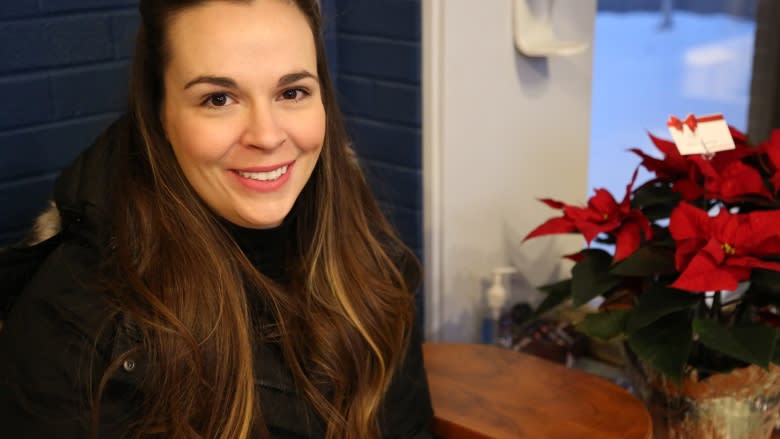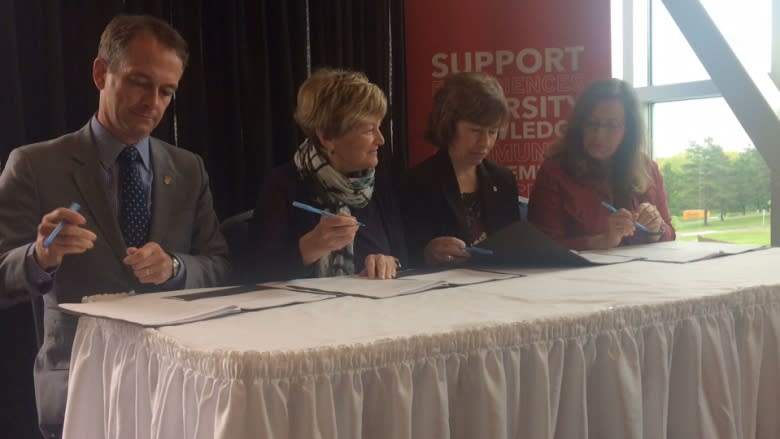60 sexual assaults on New Brunswick campuses disclosed to new advocate
Sixty sexual assaults on New Brunswick campuses were reported to the new sexual assault support advocate during her first 32 weeks on the job, a report says.
Advocate Maggie Forsythe says in the report that 38 of the disclosures involved the University of New Brunswick Fredericton, UNB Saint John or the UNB campus in Moncton.
Most of those 38 cases, or 92 per cent, involved UNB Fredericton, the report said.
Forsythe's job as campus sexual assault support advocate was created in June to help women and men be more comfortable coming forward about sexual violence at UNB, St. Thomas University and the New Brunswick Community College in Fredericton.
Mount Allison University and francophone campuses are not included.
What the UNB report calls "disclosures" to the advocate are different from reports of sexual assault that are made to the university administration or police.
But 18 per cent of the disclosures made to Forsythe were forwarded to the UNB student disciplinary team.
Details of how these were resolved were not included in the report.
Nor was there any reference to a total number of sexual assault reports made to police or an indication of whether there was any overlap between the "disclosures" to the campus advocate and the "reports" to police.
Twenty-two disclosures were related to St. Thomas University. Eight were previous assaults from childhood or occurred when the person who made the disclosure was not a student.
Fourteen of the total number of incidents involved assault committed against students but not necessarily by students, the report said.
Four formal complaints were filed with the STU administration, and one of these went to police. STU said it plans to release a separate report on sexual assault in January.
No disclosures came from New Brunswick Community College in Fredericton.
According to Forsythe, one in five students has reported having been a victim of sexual violence, and the statistics have remained consistent over the years.
When a student discloses an assault to her, several things can happen, she said.
The process
She said her job is to try to help people understand and exercise their options. A victim can opt for therapy, counselling or pursuing a formal complaint with the university administration or police, she said.
When a report is filed with the administration, an investigation is done through the university, which decides on disciplinary action.
"They have the ability to have informal measures as well," she said.
These can include no-contact orders through security or moving a student to another dorm.
"They may want nothing to happen," she said of victims.
Forsythe's position was created in June as part of a joint investment for a tri-campus sexual assault strategy.
The report on sexual assaults did not contain numbers for previous years.
But Brock Richardson, director of student services and residence life at St. Thomas, said he believes disclosures have increase, indicating people are more comfortable coming forward, and Forsythe's position is doing what it was designed to do.
He said it's important for victims to feel in control after an event.
"Putting them in the driver seat."
Mary Ellen Kingston-Richie, director of student development at NBCC, said that while there were no disclosures at her school, she believes the reality is different.
She said it's going to take more work to erase the stigma of coming forward with a complaint about sexual assault.
Lower bar
Forsythe said the university approach is different from the criminal investigation system.
The universities "need to know that more likely than not that this happened, as opposed to beyond a reasonable doubt," she said.
She said the bar is set differently when it comes to establishing and handing out punishment.
"They're not really capable of … really harsh sentences," she said.
To her knowledge, no one has ever been expelled from university but there have been suspensions, fines and mandatory education for an accused person.
Forsythe, too, said there is always work to be done.
"There needs to be a cultural shift," she said. "You see a lot of people coming forward, saying that this is not OK."



